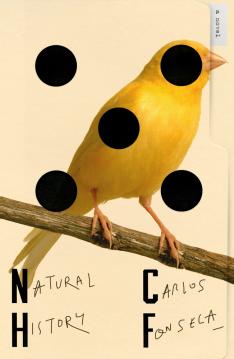
The book: In this literary tour-de-force, translated from its original Spanish, Carlos Fonseca *15 introduces a natural history museum curator who finds himself knee-deep wading through the fascinating family history of a fashion designer who died before completing an exhibition for the museum.
Natural History (Farrar, Straus and Giroux) engages several storylines, probing the tenuous boundaries delineating art from science and crossing the globe from Israel to Latin America as the curator pieces together the fashion designer’s abandoned project and attempts to look beyond his conceptions of reality.
The author: Carlos Fonseca *15 was born in San José, Costa Rica, and spent half of his childhood and adolescence in Puerto Rico. In 2016, he was named one of the twenty best Latin American writers born in the 1980s at the Guadalajara Book Fair, and in 2017 he was included in the Bogotá39 list of the best Latin American writers under 40. He is the author of the novel Colonel Lágrimas, and in 2018, he won the National Prize for Literature in Costa Rica for his book of essays, La Lucidez del Miope. He teaches at Trinity College, Cambridge, and lives in London.
Opening lines: For years I remained faithful to a strange obsession. No sooner would someone start talking to me of beginnings than my mind would turn to the childhood memory of an old painter I used to watch on TN, who painted dozens of nearly identical landscapes. I’d flash on the image of that bearded old man, his solemn voice that could have been real or put-on, I never knew. On the heels of the image would come the moral, corny but efficient: the best way to avoid a new beginning was by imitating one that had come before. Inadvertently, I ended up taking that postcard wisdom to heart. The same way the old painter set to sketching yet another picture full of little trees and mountains, I would copy some other beginning stolen from my memory: a dribble of the ball, a first line that floated to the surface, an expression that would start a conversation. That repeated inauguration encompassed everything. For years, I thought that was the way to protect myself from the horrible anxiety that overcomes us all at the thought that we’re doing something new. The old guy started painting another landscape, and I went on with my life, repeating it forward.
Maybe that’s why tonight, when the package arrived past ten o’clock, I had the feeling that it wasn’t something happening, but repeating. I heard a car pull up outside, looked out the window, and saw it all: the old, elegant green car; the driver taking something from the trunk; the curious faces of the teenagers who stopped on their bikes to watch. I understood immediately what it was about, but even so it took me a few minutes to answer the door. I decided instead to pour myself a drink, turn up the music a little, and wait until the last possible moment. Only when I felt that the driver was about to leave did I set the drink on the table, go downstairs, and confront what I’d been expecting: the familiar but now almost forgotten face of a man who handed me a package.
Review: “Fonseca’s inventive, complex tale reads like a literary onion, constantly revealing new narratives and layers of meaning . . .The various characters’ perspectives blur the line between memory and fantasy, and their charm will keep readers along for the very intricate ride. Fonseca’s innovative puzzle box of a novel packs a powerful punch.” — Publishers Weekly (starred review)

